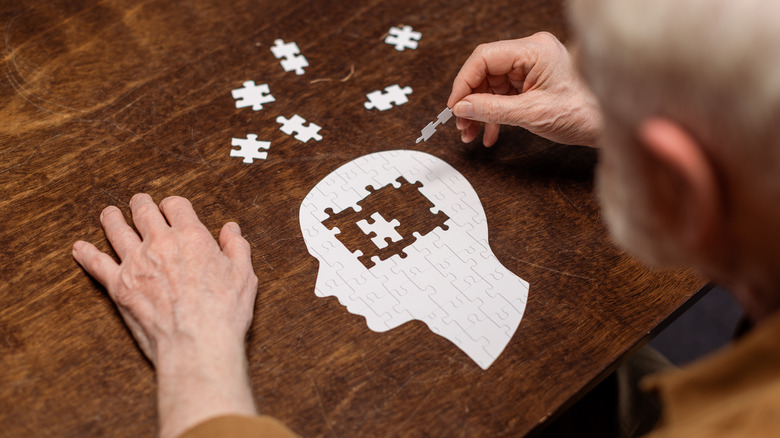This New Tool May Predict Your Risk Of Dementia
Of all the changes to our bodies as we age, the one feared by most is the possible onset of dementia. Some feel that memory loss and reduced personal function are natural parts of aging. The Alzheimer's Association disagrees, however. Dementia — the umbrella term for many age-related conditions that affect cognitive function, including Alzheimer's — is caused by damage to our brain cells. This damage prevents them from communicating effectively, which leads to dementia's more visible and well-known symptoms.
There is currently no cure for dementia. And, as diagnosis usually occurs after outward symptoms begin, the damage to our brain cells is largely unavoidable. There is hope, however. A new tool currently available in Canada may be the first step to early dementia detection. It is essentially a survey available on the Project Big Life website. It is one of four calculators currently available, all of them meant to help Canadians live a fuller, more aware life as they age.
The dementia calculator was made possible through a collaboration between the Bruyère Research Institute, the University of Ottawa, The Ottawa Hospital, and the ICES, which is the oldest intergovernmental science organization on the planet. According to a paper published in the Journal of Epidemiology and Community Health, the calculator was made possible by a survey of more than 75,000 Canadians who suffer from dementia. This survey helped identify at-risk groups, which in turn informed the creation of the calculator.
How it works
One key aspect of the calculator is that you do not need a doctor's help to access it. Currently it is meant to help Canadians but anyone can access it on the Project Big Life website. Respondents have to be at least 55 years old to use the calculator, but beyond that, it only requires the kind of information that most people have readily available at their fingertips.
According to Neuroscience News, this includes demographic information (age, immigration status, education, ethnicity, etc.), health concerns (preexisting conditions, activities that respondents need help to complete), and lifestyle factors (smoking history, diet, physical activity, socioeconomic status, etc.).
Some of the questions, particularly those about income and ethnicity, may seem overly invasive. The project's senior author, Dr. Peter Tanuseputro, makes a compelling argument for them, however.
"The COVID-19 pandemic has also made it clear that sociodemographic variables like ethnicity and neighbourhood play a major role in our health. It was important to include those variables in the tool so policy makers can understand how different populations are impacted by dementia, and help ensure that any prevention strategies are equitable."
While we may be decades — or more — away from a cure, tools like this calculator can help people get ahead of the curve. They can soften the impact dementia has on their lives, allowing for better quality of life and improved understanding of dementia as a whole.

